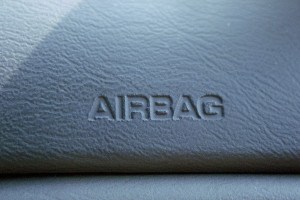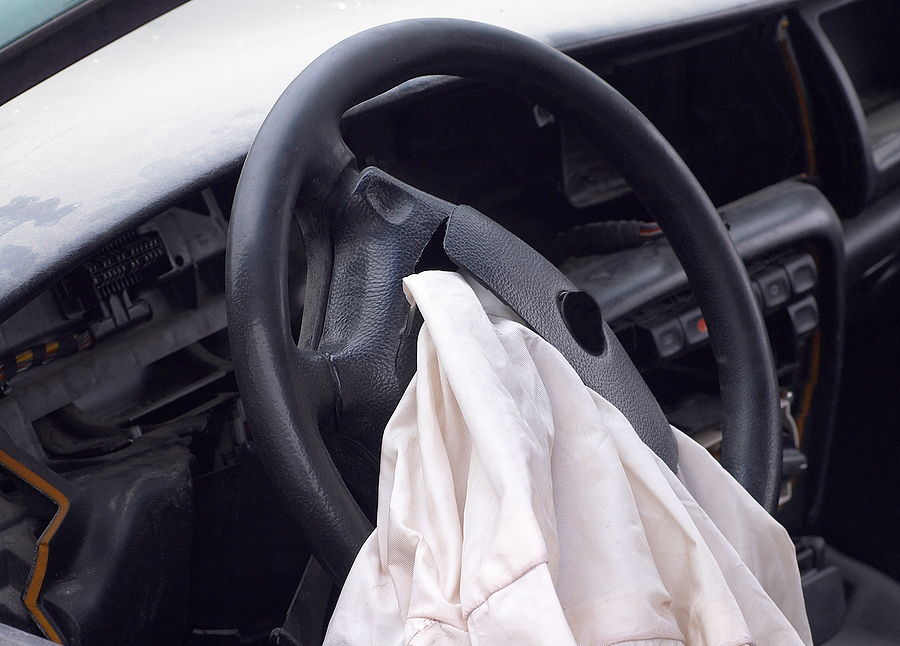Confidential settlements over defective Takata Corp. airbags are sealing off relevant information that other victims could use to pursue injury claims.
The accords make financial sense for the settling parties, but Takata and other defendants, including Honda Motor Co., General Motors Co. and Fiat Chrysler Automobiles NV, get an extra advantage in keeping damaging information out the hands of outsiders interested in suing them. The quick, secret deals, a cornerstone of product liability litigation across industries, help explain why, years after the first recalls, so much remains unknown about defects linked to four deaths in the U.S. The few cases filed have generally been resolved before victims’ lawyers acquired evidence.
Five of a dozen lawsuits reviewed by Bloomberg News were settled before information could be revealed in courts. One of the cases is being reviewed for a possible settlement, while one is in mediation and another was dropped. None has gone to trial.
The lack of information deepens the confusion surrounding an escalating crisis. Recalls of more than 7 million vehicles by at least 10 carmakers have left drivers unsure about whether they’re at risk. Safety advocates blame the National Highway Traffic Safety Administration for not doing enough in its probe of Takata while a federal grand jury has sent the company a subpoena to turn over documents and explain the defects with its safety devices.
‘Very Murky’
“It’s very murky,” said Ralph Nader, who has been advocating for auto safety since the mid-1960s. “There’s a lot there that escapes NHTSA, escapes Congress, escapes the media, escapes the consumer groups. The best information is usually coming out of product-liability suits, but they’re settling out. There haven’t been any public trials yet.”
Police documents and lawsuits describe Tokyo-based Takata’s airbags deploying with so much force that their metal housing became shrapnel. The exact causes are still unclear and NHTSA is investigating whether high humidity plays a role.
 The emerging theory is that the chemical propellant in the heart of the airbags deteriorates due to moisture, production flaws or the passage of time — creating an unstable mix that explodes with more force than intended, according to documents and auto-safety experts.
The emerging theory is that the chemical propellant in the heart of the airbags deteriorates due to moisture, production flaws or the passage of time — creating an unstable mix that explodes with more force than intended, according to documents and auto-safety experts.
Humid regions where cases are concentrated include Florida, where Damian Fernandez, 40, was injured when his 2006 Dodge Charger, a Chrysler vehicle, was hit at an intersection in Hialeah and a flying metal shard sliced open his leg. He reached an agreement with Chrysler 10 months after the September 2013 crash without filing a lawsuit.
‘Shut Us Up’
“They wanted to resolve this immediately,” his lawyer, Jason Turchin, said in an interview about the agreement, whose terms he said he can’t disclose. “It almost seemed like they were going to pay us off to shut us up.”
Settlements are often pursued to avoid the costs of litigation and terms are confidential to preserve the privacy of the parties, Mike Palese, a spokesman for Fiat Chrysler Automobiles, said in an e-mailed statement.
Takata doesn’t comment on pending litigation, spokesman Alby Berman said in an e-mailed statement. The company is cooperating fully with NHTSA and is working to meet its requests, he said.
Confidential agreements are keeping valuable information out of the public eye, lawyers and safety advocates say. Many of the details that helped get to the root of a General Motors ignition-switch flaw came from statements made in depositions after the Detroit-based carmaker chose to fight a lawsuit rather than settle, said attorney Lance Cooper. His pursuit of a wrongful death case involving a GM vehicle is credited by safety advocates with triggering recalls of 2.59 million vehicles this year.
GM Recall
GM has no comment on the role of the lawsuit in its recall decision or its settlement of a Takata air-bag case, said Alan Adler, a company spokesman.
The carmakers and Takata aren’t necessarily using confidential settlements to keep information from the public, Erik Gordon, a University of Michigan law professor, said in a phone interview. They may be keeping the amounts silent to keep them from being used by plaintiffs’ lawyers to force higher payments, he said.
“This is standard products liability stuff,” Gordon said. “This is not a car company trick.”
Injuries, Costs
Many of the injuries from Takata airbags are minor, which is why there are so few lawsuits, said Cooper, who isn’t involved in any of those cases. Taking on a product-defect case can cost a plaintiffs’ firm $250,000 or more, he said. “It doesn’t make sense to sue Takata or the car company.”
Lawsuits can backfire on consumers when small injuries get overblown by plaintiffs’ lawyers and lead to “frivolous” cases that can create hysteria, said Jason Vines, author of“What Did Jesus Drive? Crisis PR in Cars, Computers and Christianity.”
While running public relations at Ford Motor Co., he helped guide the company’s response in 2000 to the recall of Firestone tires linked to 200 deaths. People with tires that weren’t recalled were insisting on replacements, leaving others with dangerous tires waiting, he said.
Automakers’ concerns about possible frivolous lawsuits aside, settlements mean the public remains unaware of possible flaws, Cooper said.
“NHTSA is in many cases asleep at the wheel,” he said. “They don’t get out in front of the problem.”
NHTSA Order
After similar criticism last month, NHTSA ordered Honda Motor Co. and Takata to provide detailed answers to questions about airbag failures and the companies’ responses.
“This summer I called 12 major automakers to Washington and made clear they must never hide critical safety information behind the cloak of attorney-client privilege and that is a message I share with lawyers who know of evidence of a safety defect,” David Friedman, NHTSA’s acting administrator, said in an e-mailed statement. “Failing to share safety information in a timely manner costs people their lives.”
The Center for Auto Safety, a watchdog group, said Honda failed to report at least two fatal accidents involving Takata airbags to a NHTSA database used to spot defect trends. The Tokyo-based carmaker announced last month that it asked a third party to begin an audit.
Oklahoma Death
One of the cases involved Ashley Parham, whose May 2009 death was linked to an air bag. A lawsuit brought by her family was settled that August in state court in Oklahoma City.
The family of Gurjit Rathore, who died when a mail truck struck her Honda Accord in December 2009, also settled. The lawsuit, filed in April 2011 in state court in Richmond, Virginia, ended in a settlement for $3 million from Takata in January 2013, according to court records. Jay Tronfeld, the family’s lawyer, declined to comment, citing a confidentiality agreement.
Kristy Williams sued Honda and Takata in Georgia state court in May 2010. While stopped at a red light in Morrow south of Atlanta and without a collision, shrapnel flew from the air bag in her 2001 Honda Civic and severed her carotid artery, according to her complaint.
Williams stuck two of her fingers in the gaping neck wound to staunch the bleeding as she waited for an ambulance. The blood loss led to several strokes, a seizure and a speech disorder, according to her lawsuit.
Terms Confidential
The case settled in January 2011, according to the docket. The terms are confidential, Joel Wooten, her attorney, said in an interview, declining to comment further.
Honda has confirmed 30 injuries and three deaths, including a pregnant woman in Malaysia, and is reviewing fatal accidents in Florida and California.
“In the interest of our customers, we seek to resolve individual customer concerns quickly and to the mutual satisfaction of all involved parties,” Chris Martin, a Honda spokesman, said in an e-mailed statement.
The pending cases include Dorothy Gravlin’s lawsuit against Mazda Motor Corp. and Takata. Gravlin was traveling in her 2005 Mazda 6 at “a very slow speed” in April, when she rearended a car that had stopped abruptly in front of her, according to the lawsuit. She “sustained a traumatic brain injury” from shrapnel after the airbag deployed, according to the suit. Sean Cleary, her attorney, declined to comment.
Crash Injuries
Gravlin suffered “abrasions on her face and arms,” which were treated on the scene, according to the police report. Mazda, which doesn’t usually comment on pending lawsuits, is making an exception in this case, Jeremy Barnes, a company spokesman, said in an e-mail.
“The plaintiff recently shared with us that her ‘traumatic brain injury’ as called out in the complaint is actually better described as headaches and short-term memory loss,” he said. “Secondly, Takata will take the lead in defending this suit on Mazda’s behalf.”
Takata and the carmakers, like any defendant, pursue settlements if they believe the odds are against them at trial, said Carl Tobias, a law professor at the University of Richmond in Virginia.
“The clearer the defect is, the more likely they are to settle,” Tobias said.
Stephanie Erdman, 29, was driving her 2002 Honda Civic on Sept. 1, 2013, on Interstate 98 near Dustin, Florida, when she hit a second vehicle in what her lawyers called “a relatively mild collision,” according to her lawsuit against Honda and Takata.
The airbag burst as it deployed, and a metal fragment lodged into her right eye, according to the suit. Erdman, while retaining her vision, underwent eyelid reconstruction in December and faces a second surgery.
“They’re trying to get us to settle,” Rob Ammons, Erdman’s attorney, said in an interview. The case was scheduled for mediation this month.
(With assistance from Masatsugu Horie in Osaka.)
Was this article valuable?
Here are more articles you may enjoy.


 Berkshire Utility Presses Wildfire Appeal With Billions at Stake
Berkshire Utility Presses Wildfire Appeal With Billions at Stake  Hackers Hit Sensitive Targets in 37 Nations in Spying Plot
Hackers Hit Sensitive Targets in 37 Nations in Spying Plot  Portugal Rolls Out $2.9 Billion Aid as Deadly Flooding Spreads
Portugal Rolls Out $2.9 Billion Aid as Deadly Flooding Spreads  UBS Top Executives to Appear at Senate Hearing on Credit Suisse Nazi Accounts
UBS Top Executives to Appear at Senate Hearing on Credit Suisse Nazi Accounts 